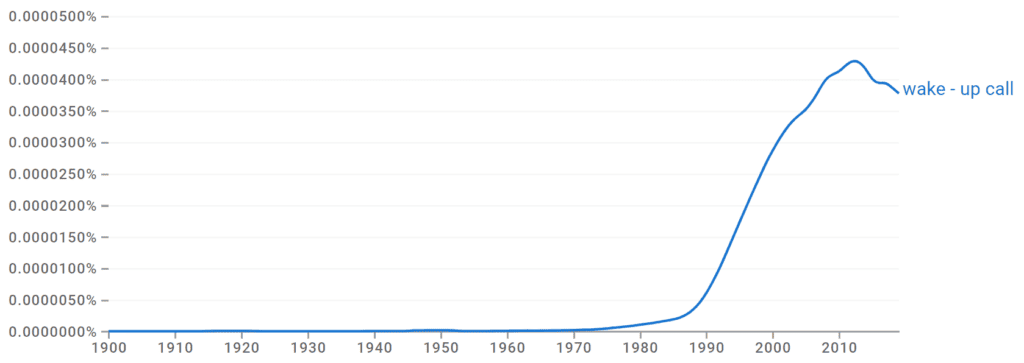A wake-up call is an idiom that conveys a sudden realization or warning. For example, I told my students that failing to complete their essays would result in a zero. For many, it was a wake-up call, and they met the assignment deadline.
The idiom wake-up call has its roots in the early days of telephones, particularly in hotels where guests could request a morning call to ensure they woke up on time.
But what’s an idiom? Idioms are unique phrases in the English language that don’t always mean what they literally say. They enrich our conversations, adding depth and cultural context. Understanding idioms is crucial when learning English, as they’re often sprinkled throughout informal conversations.
Keep reading to understand more about this idiom’s meaning and how you can use it figuratively to help get your point across.
Wake-Up Call Meaning

A wake-up call is an event or experience that serves as a sudden realization or a warning, prompting a change in behavior, attitude, or perspective. It symbolizes more than just a fleeting realization. It represents a pivotal turning point that can reshape one’s understanding or life direction.
A wake-up call can stem from a personal setback, a global event, or even a heartfelt conversation. Each serves as a powerful reminder. They highlight the ever-evolving nature of our journey and remind us of the potential for growth in every challenge.
Using Wake Up Call in a Sentence
- Losing his job was a wake-up call for Tom to reassess his career goals and pursue his passion.
- The team’s poor performance in the previous game served as a wake-up call for the players to train harder.
- Receiving a low grade on the exam was a wake-up call for Sarah to prioritize her studies and improve her academic performance.
Is Wake-Up Call Hyphenated?
Yes, it is hyphenated. The term wake-up call includes a compound modifier (wake-up) placed before a noun (call).
Wake-Up Call Synonyms
- Eye-opener
- Reality check
- Rude awakening
- Alarm bell
- Red flag
- Warning sign
- Jolt
- Revelation
- Enlightenment
- Moment of clarity
Remember, while these synonyms can convey similar meanings, the context in which they’re used can influence their exact interpretation. Always consider the specific situation when choosing which term to use.
Wake-Up Call Origins

In the early to mid-1900s, the term wake-up call had a straightforward meaning. People with telephones could sign up for a service to receive a call that would wake them up! An article from The Sydney Morning Herald in 1933 mentioned:
WAKE UP CALLS. Telephone Service Started.
But here’s a fun fact: even before this service began, the phrase wake-up call was already used more symbolically. A 1917 piece in Munsey’s Magazine reads:
“It’s not the moment to dive into the financial nitty-gritty,” he said, “but it sure is time to sound the wake-up call.”
It’s fascinating how language evolves, isn’t it?
Let’s Review
The literal use of wake-up calls comes from the idea of receiving a phone call in the early morning as a type of alarm clock replacement service. As a modern-day idiom, the term has been used figuratively since at least 1917 to mean some event or experience that prompts a change in behavior or an awakening.
Today, you can use the idiom to highlight why you have made decisions or refer to something you want to present to someone to influence change.
Check out some others we covered:
